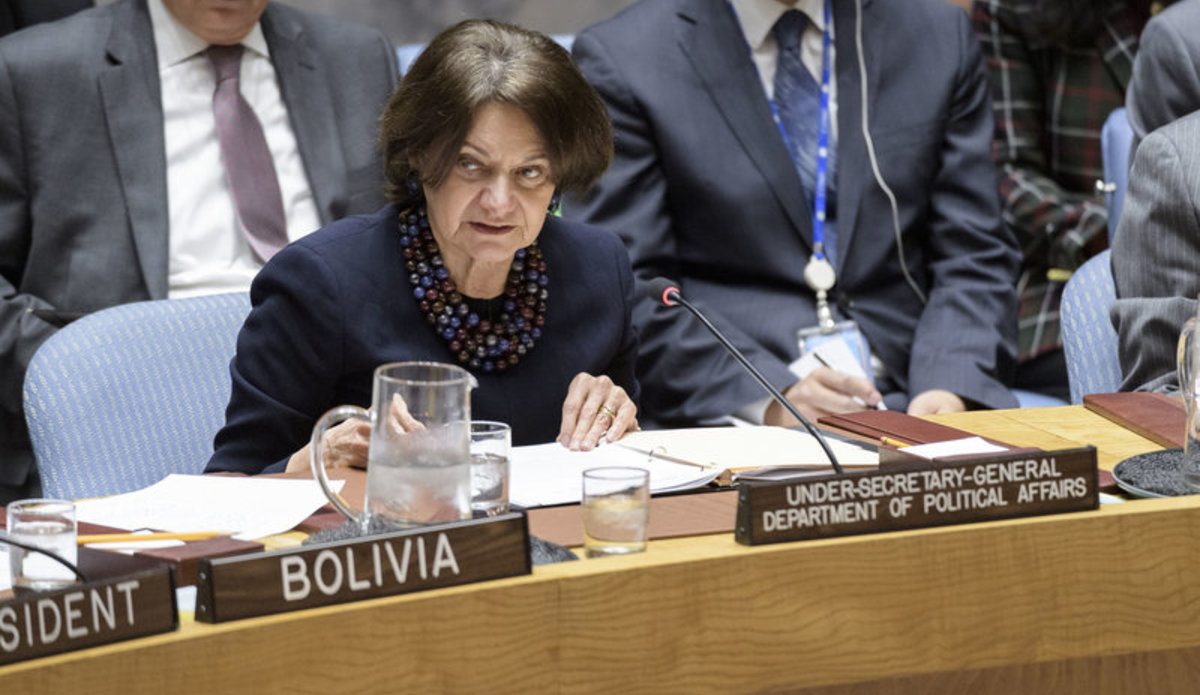Thank you, Mr. President,
Exactly a month ago, I briefed the Security Council on the protracted crisis in Venezuela, including its political, economic, human rights and humanitarian dimensions. Since then, we have witnessed an alarming escalation of tensions.
As I reported in my previous briefing to the Council, on 23 January the President of the National Assembly, Juan Guaidó, invoked provisions of the Constitution to declare himself interim President of Venezuela during an opposition-led protest. The application of these constitutional provisions were strongly contested by the Government. As part of the actions he has taken since then, Mr. Guaidó announced that food and medical supplies would be transported to Venezuela.
In response, the United States and other countries stockpiled food and medical supplies at the Colombian and Brazilian borders as well as in Curaçao.
Separately, the Russian Federation and China delivered supplies to Venezuela, in coordination with the Venezuelan Government, to be distributed to those in need.
On 22 February, the Venezuelan Government temporarily closed several international bridges at the border with Colombia as well as border crossings with Brazil. It also increased its security presence in those areas.
On 23 February, Mr. Guaidó led efforts by volunteers and other lawmakers to transport food and medicine that had been stocked in Brazil and Colombia across the border to Venezuela.
Violent incidents occurred at different points along the borders with Brazil and Colombia, as the Venezuelan security forces blocked the aid supplies coming into Venezuela.
At the Colombia border, two trucks were burned as they attempted to cross the border, with the Government and opposition accusing each other of burning them.
According to Colombian migration authorities, at least 285 individuals were injured on the Colombian side. It is our understanding that no aid from this site was allowed in.
Along the Brazilian border, indigenous groups supporting the opposition attempted to deliver aid stockpiled in Brazil and met resistance. According to the Office of the High Commissioner of Human Rights, between 22 and 23 February four deaths were confirmed near the Brazilian border and another 64 individuals were injured, most of them by gunshot.
The UN Human Rights Office also received several reports pointing to the involvement of pro-government armed elements in the violent attacks on protestors.
Mr. President,
In a statement, on 23 February the Secretary-General stated his shock and sadness at the recent violence and loss of life that brought additional suffering to the Venezuelan people.
He reiterated the appeal he had made to Venezuelan Foreign Minister Jorge Arreaza on 22 February that lethal force not be used by anyone under any circumstances. The Secretary-General also called for calm and urged all actors to lower tensions and pursue every effort to prevent further escalation.
UN High Commissioner for Human Rights Michelle Bachelet condemned the violent scenes that took place at various points along Venezuela’s borders with Brazil and Colombia. She condemned “the excessive use of force by the Venezuelan security forces” and said the Government must stop its forces from using it. She also urged the Government to “rein in” its “proxy” groups and “arrest those among them who have used force against protestors”.
Mr. President,
The Secretary-General is concerned by the serious humanitarian problems facing the country, and their impact on vulnerable populations.
While the lack of official data is a serious challenge in assessing the situation, available information depicts a grim reality with the economy continuing to deteriorate, and with people dying of preventable causes and leaving the country in search of assistance.
Civil society groups report that maternal mortality has increased by over 50 per cent since 2017 as have the number of infant deaths. Dialysis patients, among other groups of people that suffer from chronic conditions have taken to the streets to protest the lack of medicines and of services they require to stay alive.
Data used by the Pan American Health Organization (PAHO) indicates that measles is under control, but 80 per cent of hospitals lack the required medicines and 30 to 40 per cent of the medical personnel have left the country.
New estimates by the United Nations High Commissioner for Refugees and the International Organisation for Migration place at 3.4 million the number of Venezuelans who have left the country.
Mr. President,
In Venezuela, the UN system is working in cooperation with relevant state institutions and other actors, to support efforts to address these challenges. Seven resident agencies, funds and programmes and a non-resident agency, have moved from policy-oriented support to a strengthened, prioritized and coordinated UN effort that delivers assistance closest to people in need. Since 2018, the UN has been implementing a scale-up effort that consists of three pillars of action: life-saving, economic recovery, and conflict prevention and human rights. The scale up was developed in the context of the UN Development Assistance Framework for Venezuela.
Delivery of assistance is guided by General Assembly Resolution 46/182 and the principles of humanity, neutrality, impartiality and independence. Such assistance must be free from political objectives and delivered on the basis of need.
Much more remains to be done to address the extremely urgent needs of the Venezuelan people. The UN is ready to continue expanding these efforts. We will continue to act in accordance with the humanitarian principles, working with Venezuelan institutions, to assist people in need.
The Secretary-General has stressed repeatedly the importance of these guiding principles and has called on all stakeholders and Member States to respect them.
Mr. President,
As he has repeatedly stated, the Secretary-General is ready to exercise his good offices if the parties avail themselves of this option.
Venezuelan actors across the entire political spectrum have the responsibility to put the interests of the Venezuelan people at the center of their actions at this most critical time.
Thank you, Mr. President.

